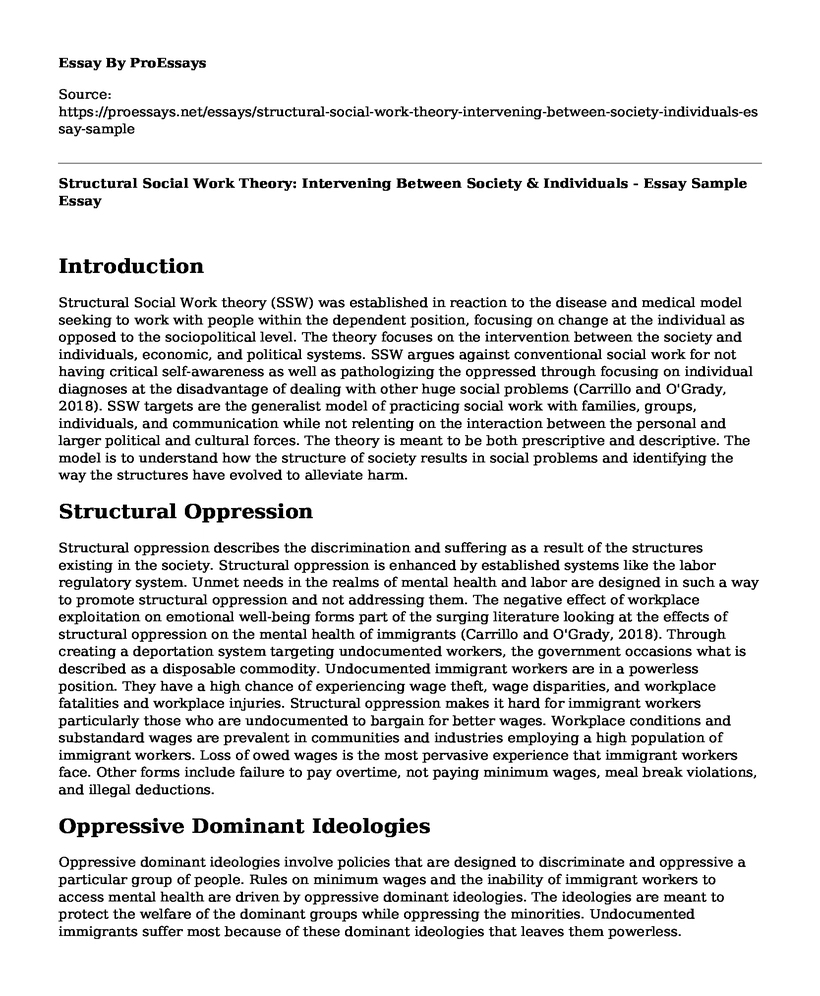Introduction
Structural Social Work theory (SSW) was established in reaction to the disease and medical model seeking to work with people within the dependent position, focusing on change at the individual as opposed to the sociopolitical level. The theory focuses on the intervention between the society and individuals, economic, and political systems. SSW argues against conventional social work for not having critical self-awareness as well as pathologizing the oppressed through focusing on individual diagnoses at the disadvantage of dealing with other huge social problems (Carrillo and O'Grady, 2018). SSW targets are the generalist model of practicing social work with families, groups, individuals, and communication while not relenting on the interaction between the personal and larger political and cultural forces. The theory is meant to be both prescriptive and descriptive. The model is to understand how the structure of society results in social problems and identifying the way the structures have evolved to alleviate harm.
Structural Oppression
Structural oppression describes the discrimination and suffering as a result of the structures existing in the society. Structural oppression is enhanced by established systems like the labor regulatory system. Unmet needs in the realms of mental health and labor are designed in such a way to promote structural oppression and not addressing them. The negative effect of workplace exploitation on emotional well-being forms part of the surging literature looking at the effects of structural oppression on the mental health of immigrants (Carrillo and O'Grady, 2018). Through creating a deportation system targeting undocumented workers, the government occasions what is described as a disposable commodity. Undocumented immigrant workers are in a powerless position. They have a high chance of experiencing wage theft, wage disparities, and workplace fatalities and workplace injuries. Structural oppression makes it hard for immigrant workers particularly those who are undocumented to bargain for better wages. Workplace conditions and substandard wages are prevalent in communities and industries employing a high population of immigrant workers. Loss of owed wages is the most pervasive experience that immigrant workers face. Other forms include failure to pay overtime, not paying minimum wages, meal break violations, and illegal deductions.
Oppressive Dominant Ideologies
Oppressive dominant ideologies involve policies that are designed to discriminate and oppressive a particular group of people. Rules on minimum wages and the inability of immigrant workers to access mental health are driven by oppressive dominant ideologies. The ideologies are meant to protect the welfare of the dominant groups while oppressing the minorities. Undocumented immigrants suffer most because of these dominant ideologies that leaves them powerless.
Summary of Intervention
There is the essence of challenging structural oppression. Worker center movement is one intervention that involves the organization of workers in the low-wage labor sector who are ignored by organized labor. It has been important to organize the unorganized. Through these organizations, immigrant workers can learn their rights and understand the laws that should not be violated. Immigrant workers have more power when they are organized.
Mental Health Intervention
The community wellness program that is based in Chicago provides health services exclusively to Latino immigrant adults that are uninsured. The program provides mental health services within satellite locations in the community. Apart from mental health, there are other supportive services like health education, family support as well as public benefits assistance that is provided.
Community Wellness Program Approach Versus Traditional Mental Approach
The community wellness program approach allowed the immigrants to express themselves and talk while they listened. There were no particular issues that the immigrant had to concentrate on but it allowed them to ventilate widely. It provided freedom and safety for exploring answers.
The traditional mental approach is structured and one has to know what brings him or her to the center. The traditional approach is specific and centers on particular items that need to be discussed at a time.
References
Carrillo, A. and O'Grady, C. (2018). Using structural social work theory to drive anti-oppressive practice with Latino immigrants. Community Wellness Program. 18(3). http://journals.iupui.edu/index.php/advancesinsocialwork/article/view/21663/22060
Cite this page
Structural Social Work Theory: Intervening Between Society & Individuals - Essay Sample. (2023, May 23). Retrieved from https://proessays.net/essays/structural-social-work-theory-intervening-between-society-individuals-essay-sample
If you are the original author of this essay and no longer wish to have it published on the ProEssays website, please click below to request its removal:
- Articles Review on Abortion Issue
- Impact of Nurse-Patient Ratio on Healthcare Costs Essay Example
- Essay Sample on Growing Concern of Alzheimer's Disease in UK
- Essay Sample on Marijuana Use: Debating Mental Health Benefits vs. Risks
- Sally's Obligation: Re-Educate Patient on Alprazolam Prescription - Essay Sample
- Essay Example on Covid-19: Global Impact on Automotive Industry
- Essay Example on Shift Changes: Impact on Nursing Teams & Patient Safety







